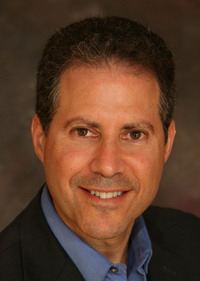Friday, February 13, 2009
Interview with Dave Newmark, Bid4Spots On Google, Radio, and more

Yesterday, Google announced that it was shutting down its Google Audio efforts--the search engine giant's efforts to try to sell radio advertising. We happened to be talking at the time with Dave Newmark, CEO of Encino-based Bid4Spots (www.bid4spots.com), about how the firm's reverse auction service for remnant radio was going, and Dave us gave his insights into Google's moves, how it affects his company, as well as an update on how things are going for Bid4Spots.
What are your thoughts on the Google announcement?

Dave Newmark: I think it goes to the fact that any marketplace needs to have a win. It has to represent a win for buyers, and also has to represent a win for sellers. I have no inside knowledge of what the experience of Google's advertisers were, but from the outside, what appears to me is that they started with their AdWords and AdSense advertisers, doing search. Those companies are used to the precision and target-ability of search. Broadcast isn't like that. Broadcast, by definition, is broader than search. Broadcast can convey the idea of making a purchase, and can motivate a purchase--but, by definition, it's not as precise and targeted as search. I believe that the advertisers they started with were probably disappointed that the cost per customer acquisition was not the same as search. Those expectations were probably too high, in terms of the CPA. I think that's too bad, actually, because what search does is capture demand very specifically for your product--but broadcast will generate demand for advertisers. Search only captures those customers who happen to be flying by, and who have already identified themselves as interested in their product. But, that's only a small percentage of the whole population who might buy their product or services.
Sellers also have to have a win. There must have been some reasons the stations did not embrace the platform, because--from what I gathered--there were not a lot of stations actively participating in the system. My hunch was it was due to two things: 1, lack of interest by advertisers, for reasons previously started--and because of a lack of advertisers, the bidding probably didn't get very high. The premise is that this was a forward auction, and it's a disappointment to broadcasters if the prices don't go up. Secondly, the system didn't--from what I understand--give a lot of control to stations. What I mean by that, is that an advertisers who gets on air is the one who pays the highest CPM, regardless of who they are. A station might not want that kind of content on the air. So, it didn't represent much of a win for buyers, and not much of a win for sellers, so this was kind of inevitable, I suppose.
How does this affect your business?
Dave Newmark: I think it's Christmas in February.
Because you're the only game in town now?
Dave Newmark: Yes, we are. The question is what game. There have been a number of different companies, trying to develop online exchanges, and I think that most of them over-reached. Advertising has to be unique and creative, and computers don't do that terribly well. If you have a limited role, and fill a very specific need to advertisers--and on the station side, you generate value by selling unsold inventory, and then the system will work well. By keeping our vision focused on that, we've been able to do that, and will continue to do that--with what looks like quite a large number of new advertisers.
Earlier we were talking about your business and how you hadn't seen any slowdown in the radio advertising business. Can you talk about this, and why the radio market is different?
Dave Newmark: We doubled our business in 2008 over 2007, a 93 percent increase, and 2009 is up there as well. There are a few factors, in my opinion. I think advertisers need to get as much value out of ad dollars, more than ever before. The value component is becoming much more important than ever, and as our reputation grows, people are understanding that they are going to get value out of us better than any other way to do radio advertising. If you look at media, and not just radio, advertisers want to get value. The other thing is, advertisers are being pulled in so many different directions, their staff is shrinking, and companies are getting smaller. There are fewer people, who have to do more. At the same time, media--or what we called media--which now includes traditional media, online media, mobile, product placement, etc.--there are so many things called media which are vying for media buyer's attention. Media is exploding. There's a number of places to put advertising dollars--and everyone is vying for that. Buyers have less time, with flat resources, against an ever growing number of media outlets. They just don't have the time to negotiate with lots of different sellers. Our platform doesn't require any time. In about two or three minuets, they can put together fairly sizeable buy in our system. They put in the parameters, and the stations do all the work. That's what advertisers like--value, ease of convenience, and speed. On the advertiser side, they like that the very best stations in the country participate in the auction. They get high rated stations, which is fabulous. And, I made the rules that the are non-pre-emptible. There is some remnant programming out there, but it is pre-emptible. Our is non-pre-emptible, which means that if you put up 25 grand for a week of ads, 25 grand will run. Normally, in remnant, you put up 25 grand, and maybe only 5 will run. That will be a great low rate, but you only ran 1/5th of your schedule.
For stations, there's the advantage of reduced headcount, and they are getting access to a whole bunch more advertisers they'd never had seen. Plus, the rates are confidential, so it doesn't degrade the value of their inventory. They can bid as low as they wish, and it won't hurt them, because we don't reveal their spot rates--even though we do reveal station names, and weekly frequency.
Speaking of the radio market, there's been some reports of declining listeners and the future of radio, what's your opinion on where that is going?
Dave Newmark: I don't have the data, but it seems to me that the fall off in advertising spending is far greater than the fall off in listening. Listening is fairly stable. I think it went from 20 hours a week to maybe 19, 18 and a half hours. It's miniscule in listening time, most of that due to iPods, CDs, and satellite radio. But, traffic is increasing. People are spending more time on the road, and, if you figure there are just as many people listening, and we recover from this deep recession, radio ought to do fine. There is certainly lots of proliferation of media online, and it's much more targeted than traditional media, but for those advertisers who want to get their message out, and are willing to take the time to come up with creative ways to use the medium, they'll do fine. There are ways to use radio personalities, use their web sites, streaming, custom skins, sponsorships, contest, and all kinds of things which are somewhat labor intensive, but they work. Radio does work.
A way to think about the radio business, is that there are three parts--a high end, a low end, and a middle. The high end is using intensive creative, using radio personalities, with costs of spots on the higher side, and really being able to leverage the relationship that a station has with the community. Stations who seek out advertisers who want to do that will do really, really well. On the bottom end, the unsold inventory, we're going to take care of that. But, the middle part is the tough part. That's your average, run of the mill buyer which radio is dependent on--the local retailer, the local car dealer, the local mortgage company--and they've been hammered, even in terms of their ability to survive as a business, period. So those dollars are going away, and will probably not come back for a long time. They will have a tough time replacing those dollars.
What's your status--you're still self funded?
Dave Newmark: We're still self funded. That has been the key to our success, and why we've lasted where others have not. We remain laser focused on meeting a specific need, and not reaching out beyond that need. Reaching out beyond that need is that investors want to you to do--they want to revolutionize a marketplace. I know from being a media buyer for 30 years, that traditional buyers and sellers, at this point in time, don't want to be revolutionized out of work. The need is not there. Moreover, I honestly believe that buyers for scheduled radio buys need to be custom crafted to meet the needs of an advertisers. It should not be done on a computer. Advertisers really want to be able to separate themselves from their competition, and radio stations want to separate themselves from the competition. In order to do that, they must be unique, and creative. computers just aren't good for that. This is a one off, creative/unique/promotional thing, where I think computers are really good and doing things over and over again. That's why we've focused on the last minute space, and leverage what Internet and compuers can do really well. Keep it simple, straightforward, limited, and just meet the need, don't overreach.